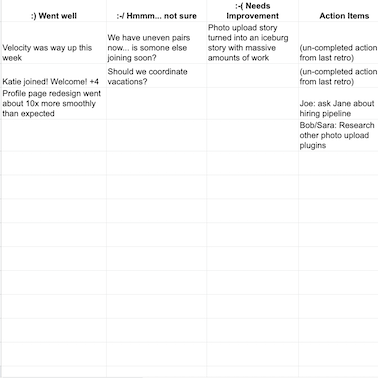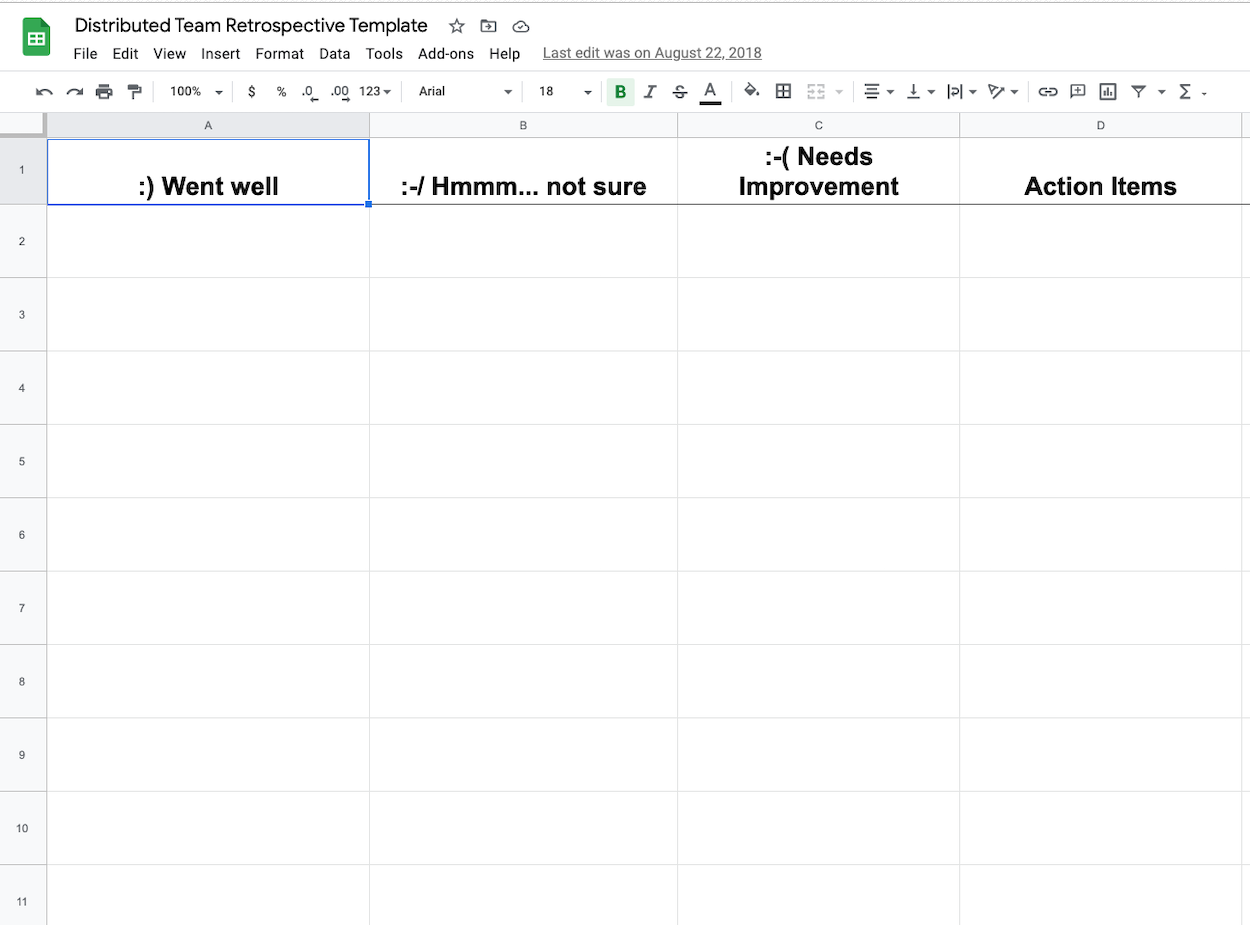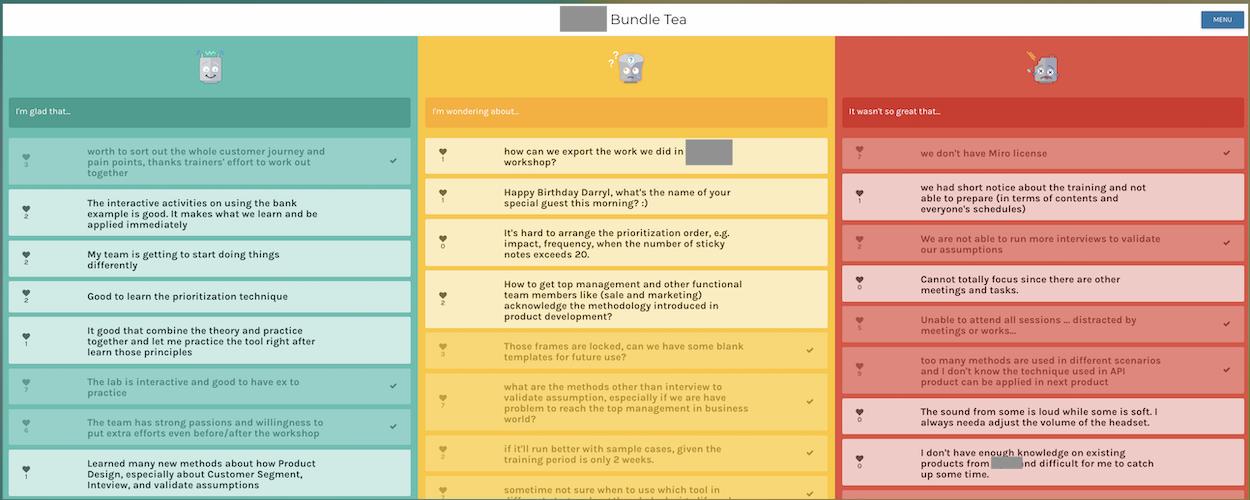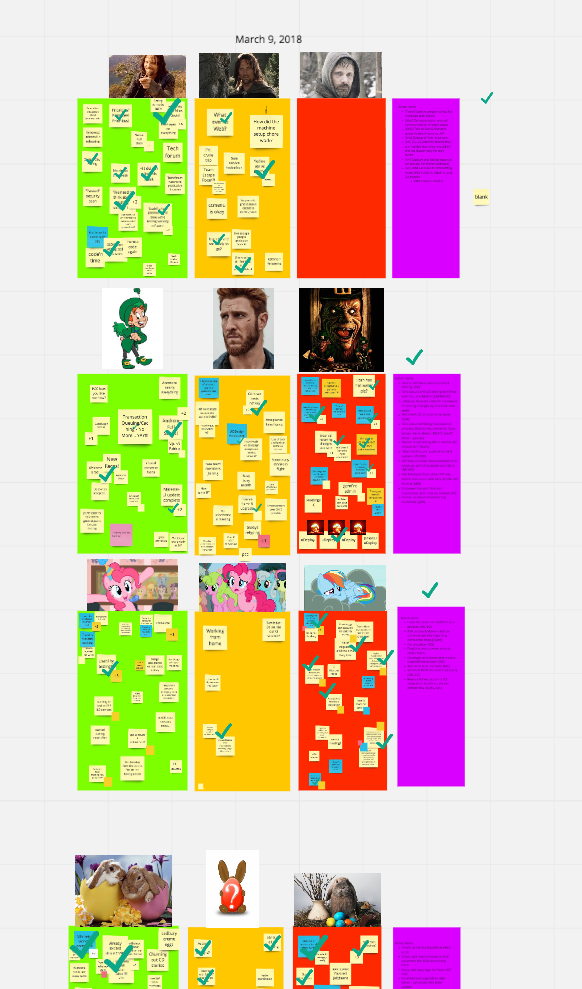
3 Column Retrospective
A way to identify how to improve teamwork by reflecting on what worked well, what could be improved, and what is on people’s minds.
Phases
Suggested Time
1 Hour
Participants
Core delivery team
Why do it?
For the team to be truly reflective, members must feel safe enough to be self-critical. It is important, therefore, to establish high psychological safety.
When to do it?
Ideally, a team should run a retrospective on a weekly basis.
What supplies are needed?
- Whiteboard or digital version like Miro
- Sticky notes
- Sharpies / markers
How to Use this Method
Remote Tip: For distributed teams, use Miro or a similar “digital whiteboard” and adapt the in-person aspects to the digital world, such as drawing and using sticky notes.
There are many online tools that support team retrospectives. We’ve listed several in the “For Remote Teams” section below.
Sample Agenda & Prompts
-
Draw three columns on the whiteboard or digital workspace:
- What went well (“I’m glad that”)
- Questions (“I’m wondering about”)
- Opportunities (“It wasn’t so great that”)
Give each person 10 minutes to add items under each column, 1 idea per card. There is no limit to how many cards people can add, and everyone should feel free to freely add items to voice their ideas and concerns.
-
Give members 5 minutes to vote on the cards they feel are most important to discuss.
-
Start on a column and begin discussing the highest voted card (facilitators may choose to start on ‘What went well’ to start the retro on a positive note, but it is up to the individual where to begin). Be sure to give the author of the card time to further elaborate what he/she wrote.
-
For items which require follow-ups, add a card to the ‘Action Items’ section/column, asking for volunteers to be accountable for each action.
Tip: Ask for volunteers in pairs, so that no one person is responsible for an action item by themselves.
-
Move to the next column and discuss the highest rated card.
-
Continue steps 5-7 until all cards have been covered, or only 5 minutes remain.
Tip: End this part of the retrospective with a “What went well” item. This ensures the retrospective discussion ends on a positive note.
-
For the remaining 5 minutes, review the Action Items, making sure each item has a person or pair assigned.
Success/Expected Outcomes
Success is when the core team has a shared understanding of:
- The most important things that happened during the week, Sprint, project planning iteration, or whichever time-span is the subject of the retrospective
- The challenges they are currently facing
- The actionable steps they will take to try and improve
Facilitator Notes & Tips
- If this is the first retrospective run with the team, provide background and set the expectation on what a retrospective entails.
- Keep conversations constructive and respectful
- Consider holding retros on Wednesday. This will provide a couple of benefits. First, the action items can be acted upon immediately (next day) as opposed the following Monday. This will better track progress amongst team members. Second, members tend to be more engaged mid-week compared to end-of-week, providing greater engagement from every individual.
- To successfully manage action items, start with a verb, be specific, include an achievable target date, and ensure there’s at least one owner
- It’s important to manage the action Items from each retro - there is no benefit in performing retrospectives if the team does not act upon it to improve team dynamics
- While some may choose to run a retrospective every two weeks, a weekly cadence provides an optimal feedback loop frequency for the team to proactively improve team dynamics.
- Timebox discussion on each card to ensure you can cover as many cards in the retrospective.
- To better keep track of Action Items from previous retrospectives, consider creating a Kanban board (‘Backlog’, ‘In Progress’, ‘Done’) on a whiteboard visible to the entire team (or on a Miro board if it is done remotely)
- If possible, create a different environment when running the retro so that members can actively disconnect from the daily work tasks and solely focus on the retrospective. This may include moving to a different floor or providing snacks to the team.
- At the end of the retrospective, consider asking the team whether there was any card not discussed which any individual feels strongly about.
Related Practices
Variations
For Remote Teams
There are many free retrospective tools available.
- Team Retrospective Miro Template from Atlassian
- Trello Template - Glad, Sad, Mad
- Postfacto - open source and deployable by you.
- Spreadsheets - You can always make a simple 3-column retro board using Google Sheets or Excel.

Sometimes it’s worth paying for something that’s being actively maintained and enhanced. Here are a few options.
| Name | Pricing | Notes |
|---|---|---|
| Fun Retro | GBP £84/month for 6 teams (£14/team/month) | Established tool. |
| TeamRetro | USD $90/month for 6 teams ($15/team/month) | Established and feature-rich tool. |
| Retrium | USD $29/team/month | Established and feature-rich tool. |
| ScatterSpoke | USD $225/100 users/month ($2.25/user/month) | Established and feature-rich. |
| Neatro | USD $17/team/month | Simple UI. |
| Parabol | USD $6/user/month | Open-sourced. Established. |
| goReflect | USD $2.67/user/month | Simple UI. |
| Reetro | Free to sign up, used to have paid upgraded features. | Less established than other options. |
Real World Examples
Example using Postfacto
There are many free retrospective tools available.

3-Column Retro with fun themes using Miro
Online tools like this allow for people to get more engaged with fun themes.

Recommended Reading
Agile Retrospectives - Making Good Teams Great by Esther Derby and Diana Larsen, Foreword by Ken Schwaber
How to Run a Really Good Retrospective - Blog Post by Nicola Rushton
Measure Success in Agile Retrospectives – Video by Enrico Teotti